Did you know full-size trucks can tow over 20,000 pounds? Full-size SUVs can only tow about 9,000 pounds. This big difference is one thing to think about when picking between a truck and an SUV.
Choosing between trucks and SUVs isn’t just about towing. You also need to think about space for people and stuff, how much gas they use, and safety features. This guide will help you understand the good and bad of each choice.
Things like repair costs, gas mileage, and safety ratings are important. Trucks cost about $46,500 on average, while large SUVs cost around $60,000. Let’s look at the main things to think about when deciding between a truck and an SUV.
Key Takeaways
- Trucks excel in towing capacity, while SUVs offer more passenger space
- SUVs generally have lower annual repair costs compared to trucks
- Safety ratings tend to favor SUVs, but both vehicle types offer advanced safety features
- Fuel efficiency is typically better in SUVs, especially in smaller models
- The choice between a truck and SUV depends on your specific needs and preferences
Understanding Truck vs SUV: Key Differences
Choosing between a truck and an SUV is important. Each has its own special features. Let’s look at what makes them different.
Size and Structure Comparison
Trucks and SUVs are not the same. Trucks have open beds for big loads. SUVs have closed spaces for comfort.
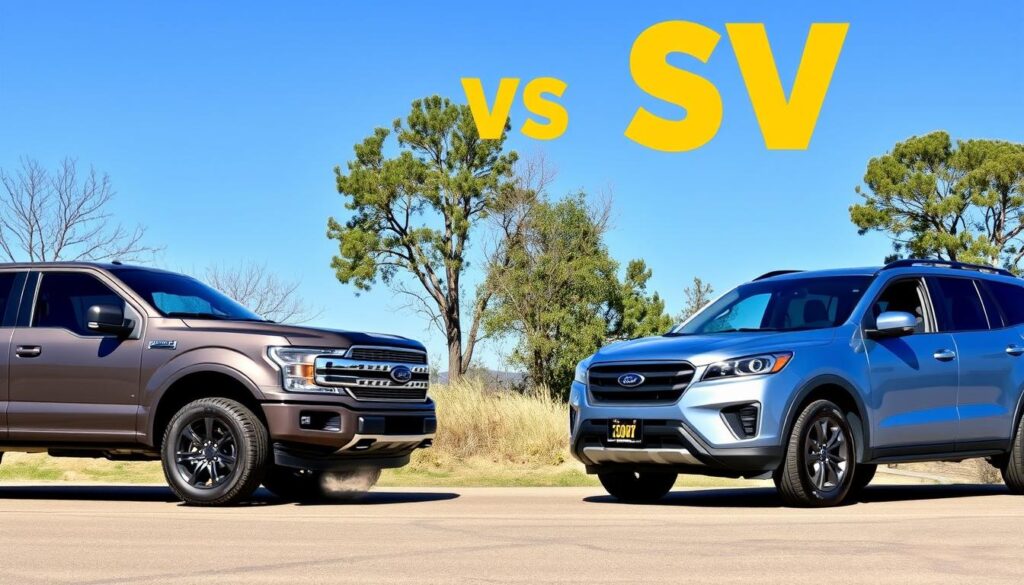
Basic Design Features
Trucks have strong springs and high ground clearance. They are built for heavy work. SUVs are better for gas and comfort.
Primary Use Cases
What you need decides between a truck and an SUV. SUVs are great for city and family trips. Trucks are for off-road, towing, and heavy loads.
At Indy Auto Man, you can see over 190 SUVs and trucks. Find the right one for you.
| Feature | Truck | SUV |
|---|---|---|
| Cargo Space | Open bed | Enclosed |
| Fuel Efficiency | Generally lower | Better, especially smaller models |
| Primary Use | Hauling, towing, off-road | Family transport, urban driving |
| Insurance Costs | Typically higher | Often lower |
Towing and Hauling Capabilities
Trucks usually beat SUVs in towing and hauling. They are made for heavy work. This makes them great for moving big loads or towing trailers.
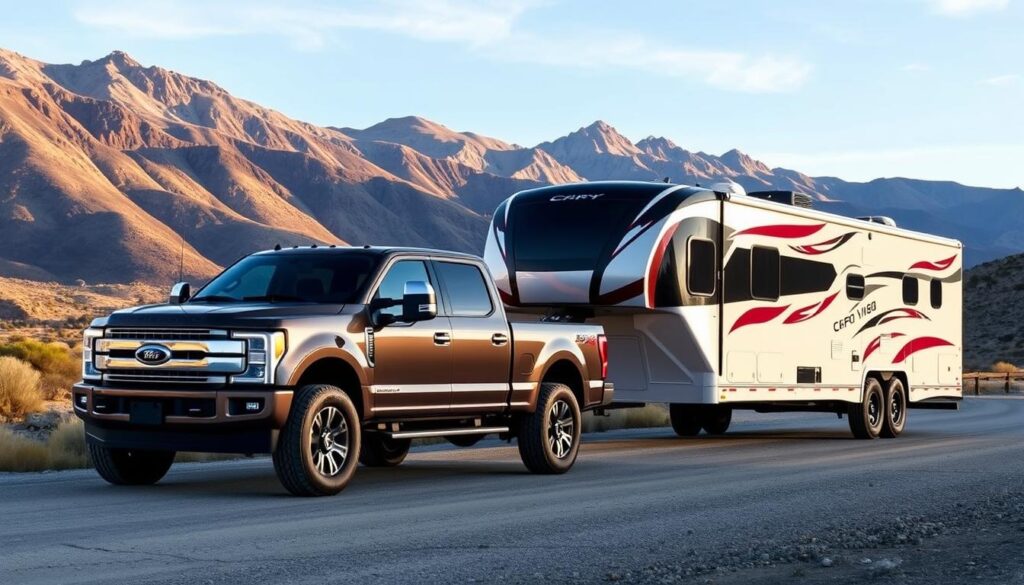
| Vehicle | Towing Capacity |
|---|---|
| Chevrolet Colorado (Pickup) | 7,700 pounds |
| Jeep Grand Wagoneer (SUV) | 10,000 pounds |
| Ford F-350 Super Duty (Pickup) | 21,000 pounds |
| Chevrolet Suburban (SUV) | 8,300 pounds |
Trucks have open beds for heavy loads. This makes it easy to carry big items. SUVs have closed spaces for cargo, keeping things inside.
It’s safe to tow up to 70% of a vehicle’s max. Trucks have big fuel tanks for long trips. A 36-gallon tank is rare in SUVs but helps a lot.
Trucks are good for towing but have some downsides. They can ride rough without a load. Their beds might not keep out the weather. SUVs are safer and smoother to drive every day.
Passenger Space and Comfort Considerations
Choosing between a truck and an SUV is big. Both are great for passengers. They offer different levels of comfort and space.
Seating Capacity Analysis
SUVs are great for lots of people. They can seat 5-8 people. This is perfect for big families or groups.
Trucks are more about carrying stuff. They usually have room for five people. This makes SUVs better for family trips.
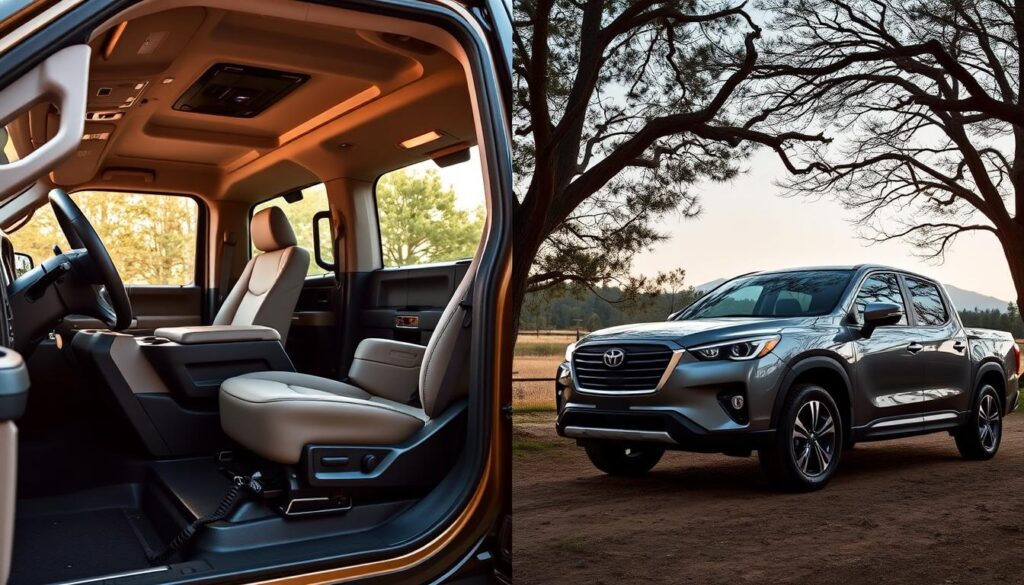
Interior Comfort Features
Both trucks and SUVs are getting more comfy. SUVs have fancy things like leather seats and cool sound systems. Trucks are catching up, too.
The cabin of SUVs is roomier. This is good for tall people.
Cabin Configuration Options
Trucks and SUVs are different inside. Trucks can be simple or have lots of room. SUVs can change to carry more stuff.
This makes SUVs great for many uses. They can be both comfy and practical.
| Feature | Truck | SUV |
|---|---|---|
| Typical Seating | 2-5 | 5-8 |
| Cabin Flexibility | Limited | High |
| Interior Space | Varies | Spacious |
Cargo Storage Solutions
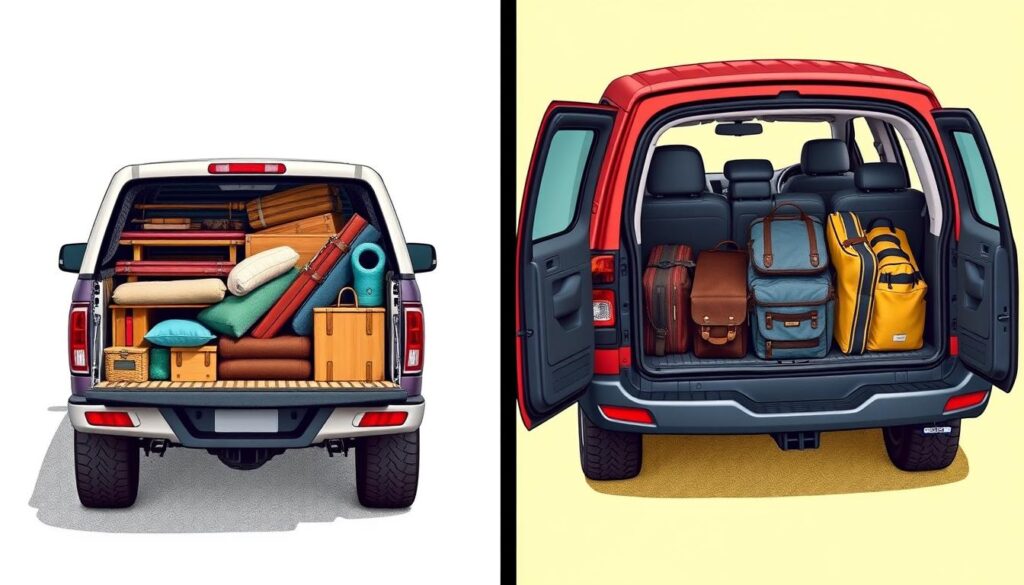
Trucks and SUVs have different ways to store things. Trucks have open beds for big items. The Ford F-150 has beds from 5.5 to 8 feet long.
SUVs have closed spaces that keep things dry. They can change how they store things. Full-size SUVs like the Ford Expedition have up to 100 cubic feet of space.
Compact SUVs have about 20 cubic feet. This grows when you fold the rear seats. Many SUV owners use roof racks for extra space.
Trucks are great for heavy loads. The Chevrolet Silverado can carry over 2,000 pounds. SUVs have smart ways to store things, like hidden spots and adjustable systems.
“The right vehicle choice depends on your specific cargo needs. Trucks offer unmatched open-air capacity, while SUVs provide secure, adaptable storage options.”
| Feature | Trucks | SUVs |
|---|---|---|
| Cargo Area Type | Open bed | Enclosed space |
| Max Cargo Space | Up to 8 ft bed | Up to 100 cu ft |
| Weather Protection | Optional covers | Built-in |
| Versatility | Large item transport | Flexible configurations |
Performance and Driving Dynamics
When picking between trucks and SUVs, think about how they drive. Each has its own strengths for different situations.
Maneuverability Comparison
SUVs are great in tight city spots. They fit well in small streets and parking lots. Trucks are more stable on big roads and highways.
Off-Road Capabilities
Both trucks and SUVs do well off-road. Four-wheel drive helps them grip tough terrain. For rough trails, trucks are better because they’re built tough and higher.
City vs Highway Performance
In the city, SUVs are easy to handle. Trucks are powerful but not as comfy in the city. On highways, trucks are smooth and strong for towing. SUVs are good for many driving needs.
| Performance Aspect | Trucks | SUVs |
|---|---|---|
| City Maneuverability | Challenging | Good |
| Highway Stability | Excellent | Very Good |
| Off-Road Capability | Superior | Good to Excellent |
Knowing how they drive helps pick the best vehicle for you.
Fuel Efficiency and Operating Costs
Choosing between a truck and an SUV affects your wallet. SUVs usually use less gas, especially the smaller ones. But, new trucks are getting better at saving fuel too.
The size and what you use the vehicle for also matter. It changes how much fuel it uses.
It’s not just about gas money. You also have to think about car repairs and insurance. Trucks cost more to fix, with an average of $936 a year. SUVs are cheaper, at $784 a year.
This can add up and affect your budget. It’s something to consider when picking a vehicle.
| Aspect | Trucks | SUVs |
|---|---|---|
| Fuel Efficiency | Lower | Higher |
| Annual Repair Costs | $936 | $784 |
| Insurance Rates | Higher | Lower |
| Resale Value | Better | Lower |
Trucks cost more to insure than SUVs or cars. This is because they cost more to fix and might carry more risks. But, trucks often keep their value better. This can help make up for the higher costs when you sell or trade in your vehicle.
Safety Features and Ratings
Choosing between a truck and SUV means thinking about safety first. Both have their own safety pluses. But, recent crash tests show some big differences.
Crash Test Results
The Insurance Institute for Highway Safety (IIHS) says SUVs usually get better safety scores than trucks. In 2019, the Ford F-150 was a top pick for crew cab trucks in passenger side small overlap tests. But, IIHS found that truck passengers might face more danger in crashes than others.
Advanced Safety Technologies
Today’s trucks and SUVs have cool safety tech. They come with systems like front crash prevention and automatic emergency braking. These features help prevent crashes and lower injury risks.
Vehicle Stability Considerations
SUVs might have a bit higher rollover risk because of their height. But, new designs and stability systems have made them safer. Studies show SUVs protect better in head-on crashes than cars.
| Vehicle Type | Safety Advantage | Safety Concern |
|---|---|---|
| Truck | Higher ground clearance | Longer front blind spots |
| SUV | Better crash protection | Slightly higher rollover risk |
Trucks and SUVs both have great safety features. Your choice should match your needs and how you drive. Remember, the quality of the vehicle also affects its safety.
Maintenance and Long-Term Costs
Choosing between a truck and an SUV means thinking about maintenance and costs. Trucks like the Ford F-350 Super Duty can tow up to 21,000 pounds. They need more upkeep, which can cost more over time.
SUVs, like the Jeep Grand Wagoneer, can tow 10,000 pounds. They might cost less to maintain. But, trucks usually cost more for auto insurance. This can add up over the years.
Depreciation is also important. Trucks, especially 4WD ones, hold their value better than SUVs. This can help lower your costs in the long run.
So, your choice should match your needs and budget. Whether you want a truck’s strength or an SUV’s flexibility, knowing these costs helps. It ensures you make a choice that fits your life and wallet.

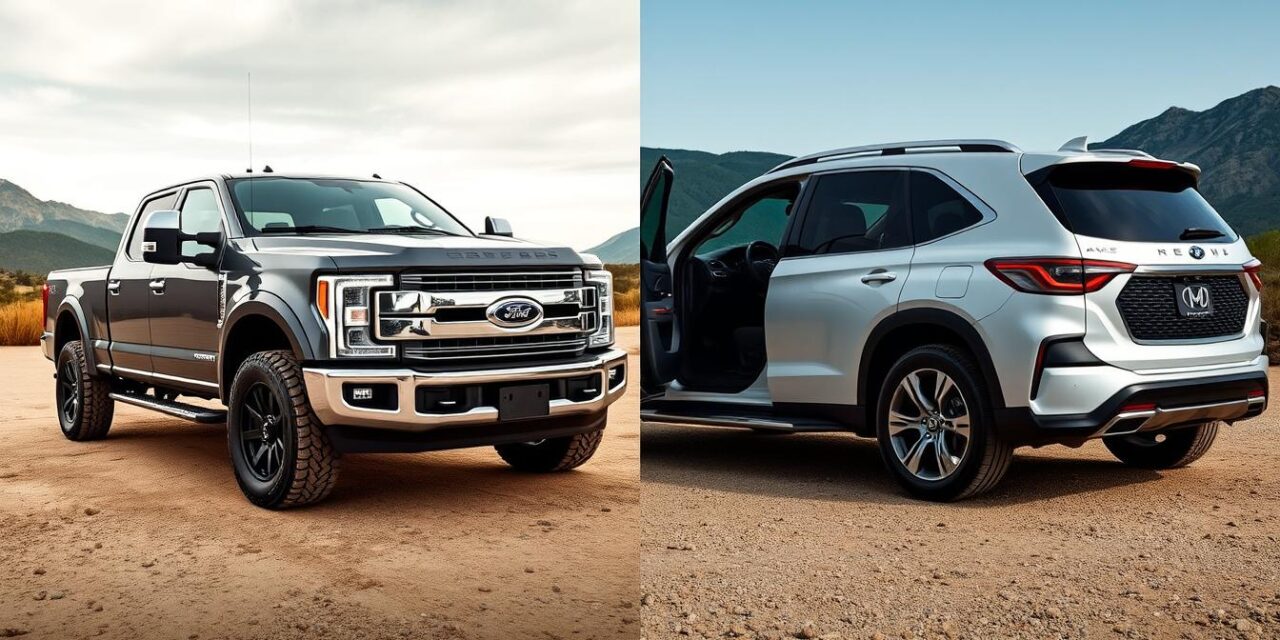


Recent Comments